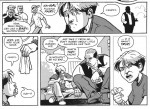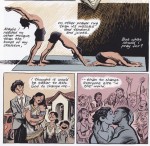Every year, I buy the Free Speech anthology published by the Comic Book Legal Defense Fund. It’s for a good cause and it’s usually full of talented artists and writers. I was even more delighted this year when I got my copy of the Liberty Annual 2011 48-page comic (which you can buy on the CBLDF site, or at Amazon), because I had no idea it partly focused on gay issues such as bullying—making it the second comic to be influenced by the It Gets Better campaign.
This year, the editor of the anthology is Bob Shreck, a bisexual editor who’s worked for DC and Dark Horse (here’s a good interview about his work on the anthology), which made him very connected. And it shows here. Even though not all the contributions are gay-related, they’re (almost) all of a high caliber, though obviously very short (most between one and four pages). Let me tell you about the gay-themed ones.
The first one is a story by Matt Wagner. Wagner has always been gay-friendly, including queer characters casually in his work, for example in his long-running Grendel series (seemingly about a masked crimelord, but it morphed into a grim and fascinating history of the future). Here he gives us a short Grendel story, where a middle-age man talks about his own experience of homophobia to a young gay kid who’s being bullied. Wagner is not one for sugarcoating problems, and the “moral” of the story is rather realistic. That, and the guy looks like a real person, not like a muscled hero, which is a big plus in my opinion.
A number of stories aren’t specifically gay-related, but make a point of being inclusive, such as the beautiful two-pager about human diversity by J.H. Williams III (who worked on the feminist and queer-inclusive Alan Moore series Promethea, as well as having been currently handed the reins of lesbian hero Batwoman) or the fun strip Cowboy Ninja Viking by AJ Lieberman and Riley Rossmo, which manages to blend wild action with a short overview of book-banning in the USA (they mention And Tango Makes Three).
Steve Niles, a well-known horror writer, does an autobiographical story (with art by Michael Montenat) about his high school days, when he mixed with a bunch of rejected kids, including some closeted gay or lesbian kids. It’s a moving story which shows well that being rejected for who you are (or being called “faggot”) isn’t limited to actual LGBT people.
Apart from a wordless tale about uniformity by Michael Bramley and Fred Hembeck (and it feels weird, in a good way, to see Hembeck drawing something else than his own version of Marvel superheroes) which one could interpret in a few ways–including the gay one, a very funny take on free speech throughout modern history written by Judd Winick (another very gay-friendly straight writer) and drawn by Thiago Micalopulos that includes a proud, gay soldier with a big mouth, we get a full-page pin-up of gay scientist Alan Turing by Frank Quitely. But the centerpiece of the comic is a seven page, full color story drawn by Craig Thompson (Blankets) entitled Flowering.
Thompson has recently published Habibi, a long graphic novel set in the Middle East (I have a copy waiting for a free weekend, and I can’t wait to read it). Some of the themes from the book, such as love and religious prejudice, are also presented here: A friend of his, poet/writer Kazim Ali, wrote this story of his own youth as a closeted Muslim kid. With rich, flowing art, Thompson poetically illustrates Ali’s struggles to reconcile his faith and his attraction to men, sensuality pouring from every panel, with young Ali marveling at the masculine bodies surrounding him. The idea of the body as a temple runs through the story—but a temple to which god, to which ideal of life?
I hope Flowering will be widely read, for its subtlety in handling its themes and for the strength of its imagery. It is one of the finest pieces of short comics that I’ve read in a while.
While I must admit I found a bit weird that no gay comics creator was involved in this anthology (Ali isn’t a comics creator and there’s a good number of openly gay creators working in mainstream and indy comics), Liberty Annual 2011 is clearly a success. Not all anthologies, especially the ones built around a worthy, laudable theme, work as well. It is a credit to the editor as much as to the creators involved.



 Bluesky feed
Bluesky feed